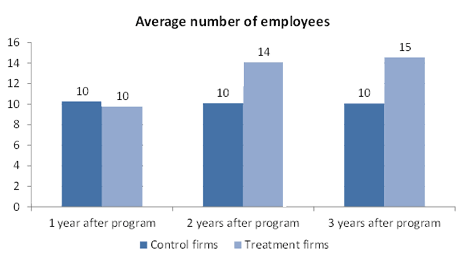Matching grant programs are one of the most commonly used policy tools for boosting productivity and technological upgrading in small firms. A matching grant typically consists of a partial subsidy to a firm for the use of business development services, such as management consultants or technical experts.
Despite their common use, there is currently little evidence as to whether or not matching grants actually improve firms’ productivity and growth prospects. One worry is that the money may simply be used for services that the firm may have hired even without a subsidy. Together with Dean Karlan and Antoinette Schoar, I conducted a randomized impact evaluation in Mexico that is among the first to document the positive effects of a matching grants program.
The program we studied was implemented in the state of Puebla and provided management consulting services to micro, small, and medium-size enterprises. The services were provided by nine local consulting firms and the state government paid for most of their fees. Beneficiary enterprises contributed only between 10% and 25% of the cost, depending on firm size. Consultants met with enterprises for at least four hours a week for a one-year period and were asked to (1) diagnose the problems that prevented the enterprises from growing, (2) suggest solutions that would help solve the problems, and (3) assist in implementing solutions.
About 430 enterprises expressed interest in the program, but the program only had resources for 150 firms. We thus randomly selected 150 treatment firms among all applicants, with the other 280 serving as a control group. All 150 treatment firms were offered a spot in the program, but ultimately only 80 of them participated. Others said they had changed their mind or did not have sufficient funds to pay their share of the costs anymore.
We conducted a follow-up survey at the end of the program to measure the effect of the consulting services on firm performance. Results from comparing treatment and control enterprises indicate that the program led to significant increases in productivity. However, we detect no increase in sales or employment due to the program in the short run. To measure longer-run effects on employment, we requested administrative data from the Mexican Social Security Institute on the firms in our study. These data show a 40 to 50 percent increase in employment 2 to 3 years after the program (see graph).

Given the large effects on productivity and employment, i.e. firm growth, an open question is why more firms do not hire management consultants. Only a small fraction of control firms in our study hired consultants on their own and others stated financial constraints as the main reason for not doing so (the market cost of the services provided through the program was US$12,000 on average).
Overall, the results from Mexico thus suggest that matching grants can indeed help firms afford services they may otherwise not hire, thereby having positive effects on productivity in the short run and on firm growth in the longer run.
Further Reading
Bruhn, Miriam, Dean Karlan, and Antoinette Schoar. 2013. “The impact of consulting services on small and medium enterprises: Evidence from a randomized trial in Mexico.” World Bank Policy Research Working Paper No. WPS 6508.


Join the Conversation